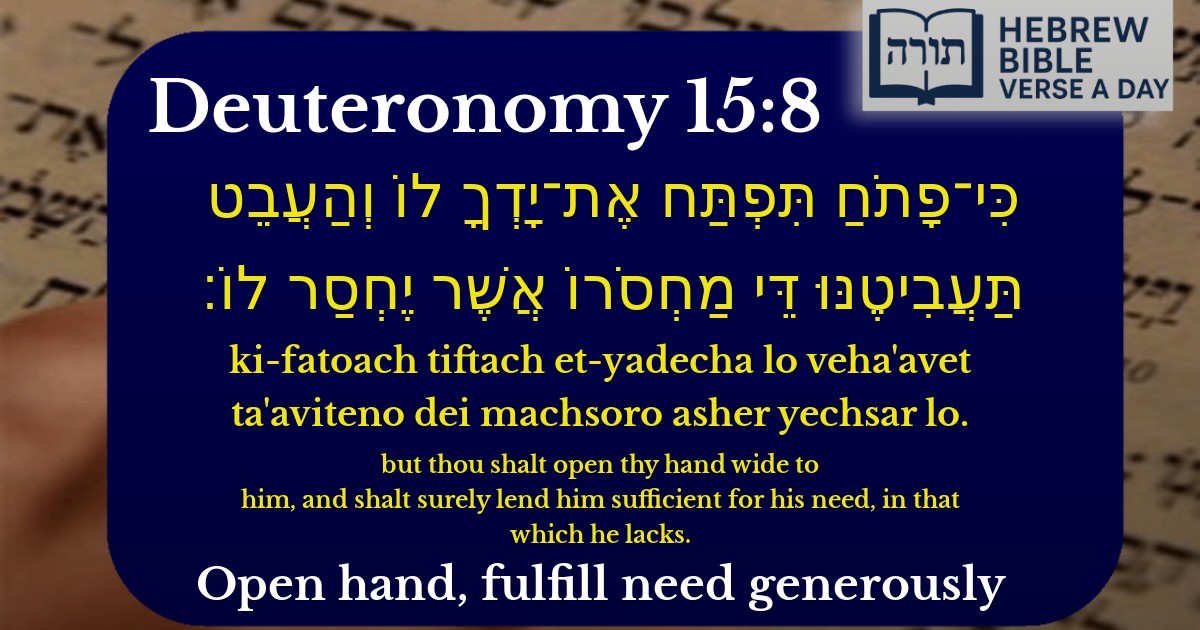Join Our Newsletter To Be Informed When New Videos Are Posted
Join the thousands of fellow Studends who rely on our videos to learn how to read the bible in Hebrew for free!
Hebrew Text
כִּי־פָתֹחַ תִּפְתַּח אֶת־יָדְךָ לוֹ וְהַעֲבֵט תַּעֲבִיטֶנּוּ דֵּי מַחְסֹרוֹ אֲשֶׁר יֶחְסַר לוֹ׃
English Translation
but thou shalt open thy hand wide to
him, and shalt surely lend him sufficient for his need, in that which he lacks.
Transliteration
Ki-fatoach tiftach et-yadecha lo veha'avet ta'aviteno dei machsoro asher yechsar lo.
Hebrew Leining Text
כִּֽי־פָתֹ֧חַ תִּפְתַּ֛ח אֶת־יָדְךָ֖ ל֑וֹ וְהַעֲבֵט֙ תַּעֲבִיטֶ֔נּוּ דֵּ֚י מַחְסֹר֔וֹ אֲשֶׁ֥ר יֶחְסַ֖ר לֽוֹ׃
כִּֽי־פָתֹ֧חַ תִּפְתַּ֛ח אֶת־יָדְךָ֖ ל֑וֹ וְהַעֲבֵט֙ תַּעֲבִיטֶ֔נּוּ דֵּ֚י מַחְסֹר֔וֹ אֲשֶׁ֥ר יֶחְסַ֖ר לֽוֹ׃
🎵 Listen to leining
Parasha Commentary
📚 Talmud Citations
This verse is quoted in the Talmud.
📖 Ketubot 67b
The verse is cited in the context of discussing the obligation to lend to the poor and the extent of one's responsibility to help those in need.
📖 Sotah 14a
The verse is referenced in a discussion about the importance of charity and kindness, emphasizing the commandment to open one's hand to the poor.


Obligation of Tzedakah (Charity) in Jewish Law
The verse (Devarim 15:8) commands us to "open your hand wide" to the needy and lend them "sufficient for his need." This establishes a fundamental mitzvah of tzedakah in Jewish tradition. Rashi explains that the double language of "פתח תפתח" (open, you shall open) emphasizes the requirement to give generously and repeatedly, not just once.
Levels of Giving According to Halacha
Philosophical Dimensions from Jewish Thought
The Sforno teaches that this mitzvah reminds us that all wealth ultimately belongs to Hashem, and we are merely custodians. The repetition of "open" teaches that we must open both our hands and our hearts - giving cheerfully without resentment.
Rambam (Mishneh Torah, Hilchot Matnot Aniyim 10:2) famously enumerates eight levels of tzedakah, with the highest being helping someone become self-sufficient through loans or business partnerships, directly connected to our verse's instruction to provide "sufficient for his need."